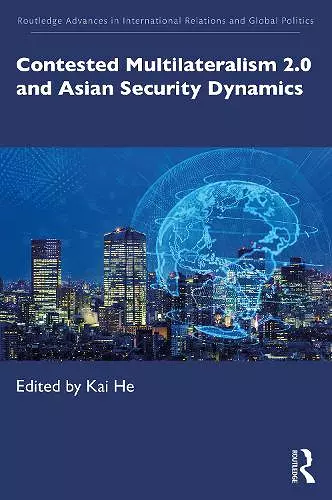Contested Multilateralism 2.0 and Asian Security Dynamics
Format:Paperback
Publisher:Taylor & Francis Ltd
Published:6th May '20
Currently unavailable, and unfortunately no date known when it will be back
This paperback is available in another edition too:
- Hardback£120.00(9780367893378)

In the 1990s there was a wave of multilateralism in the Asia Pacific, led primarily by ASEAN. Since the Global Financial Crisis of 2008, however, many non-ASEAN states have attempted to seize the initiative, including the USA, Japan, China, South Korea, and Australia.
Kai He and his contributors debate the reasons for this contested multilateralism and the impacts it will have on the region’s security and political challenges. Will the "Indo-Pacific turn" be a blessing or a curse for regional stability and prosperity? Using a diverse range of theoretical and empirical perspectives, these leading scholars contribute views on this question and on the diverse strategies of the great and middle powers in the region.
This collection will be of great interest to scholars and students of international relations in the Asia Pacific and of great value to policy makers in the region and beyond.
‘Assembling a team of leading scholars, Kai He and his colleagues have convincingly argued that "contested multilateralism 2.0" is the key to understanding the new security dynamics in Asia. A must read for all students who care about the future of Asia and multilateralism.’ - Shiping Tang, distinguished professor, Fudan University and author of The Social Evolution of International Politics
‘Regional and international institutions in East Asia have been changing their roles, functions and geographical scope along with radical power shifts in East Asian politics. Institutions have become more important tools for national foreign policies and for creating a new regional and international order. Professor He’s new edited book contributes to our understanding of this new phenomenon both theoretically and empirically, by putting together different theoretical perspectives and national policy orientations of the major countries in the region. I recommend this book to both researchers and policy practitioners who are interested in, and deal with, this important region.’ - Yoshinobu Yamamoto, Professor Emeritus, University of Tokyo, Japan
ISBN: 9780367893385
Dimensions: unknown
Weight: 453g
168 pages